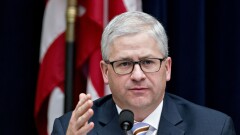After U.S. banks spent years rethinking their stances on environmental, social and governance issues in response to pressure from progressives, conservatives struck back in 2022.
Republican politicians at the state and federal levels targeted banks over their stances on issues ranging from guns to abortion. And corporate diversity initiatives faced challenges both from shareholders and in the courts.
But perhaps the biggest flashpoint was climate finance. Conservative politicians announced retaliatory measures over perceived boycotts of fossil-fuel lending and launched investigations into global decarbonization commitments made by banks.
Banks have traditionally preferred to avoid taking stances on hot-button social issues, but at a time of high political polarization, they may feel increasing pressure to choose sides.
One analyst said that the competing demands from the political left and right create a
"As banks move to assuage ESG concerns, they are at the same time, in an almost inversely proportional way, leading to a weakening of support from their traditional allies in the GOP," Isaac Boltansky, director of policy research at the investment bank BTIG, said earlier this year. "It's never going to be enough or the right temperature for both sides."
What follows is a recap of the conservative backlash against banks' ESG efforts in 2022, as well as a preview of what's likely to come next year.










